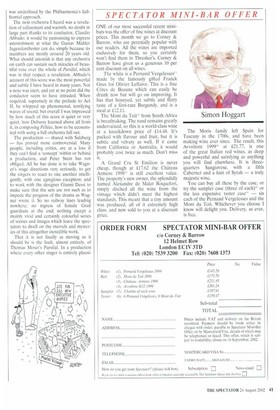Random selection
Michael Tanner
Idon't think it is unreasonable to ask for a music festival to be `themed' in one way or another, if only because, for those attending a large number of concerts and operas, it is all too easy, without some principle at work in the selection of programmes, for the festival to be nothing more than one thing after another. However lovely and stirring the individual things may be, they can easily be obliterated by the next one that comes along, with the result that at the end there is no feeling of having had a cumulative experience. Certainly I have always enjoyed most those Edinburgh Festivals which have explored some composer or composers or some aspects of a prolific composer's output in depth. It's an obvious thing to do, perhaps so obvious that it is often now avoided.
This year's Festival is hardly more than a random collection of events, almost the only linked ones being the Janacek Quartet's two magnificent Queen's Hall recitals, in which the string quartets of Czechoslovakia's greatest composers were juxtaposed. What these marvellous players make very clear, but without ostentation, is that they are performing with love, the cellist Bretislav Vibiral in particular not concealing the delight he finds in taking from or handing to his colleagues an inspiration of one of the masters they are presenting. They played both of Smetana's quartets, the First, From My Life, so affectingly that, though it was the first of the morning concerts, it was inconceivable that they would contain anything more moving. The Second Quartet, the next morning, is by comparison a hardly coherent work, but the Janaceks turned even its confusions to advantage. In that context the two Dvorak quartets they played seemed bland: while Janacek's harrowing Kreutzer Sonata, in the second concert, freshly amazing as it always is, seemed for once to have some ancestry in Smetana.
It's best not to dwell at any length on the opening concert under the precise but unpersuasive leadership of Christoph von Dohnanyi. It seems almost a tradition to begin the festivals with a large and sonorous piece by Berlioz, but the Te Deum needs much more convinced advocacy than this not to sound prolix and empty; and while Lutoslawski's Concerto for Orchestra is not prolix, its vapid noisiness
was underlined by the Philharmonia's fullfrontal approach.
The next orchestra I heard was a revelation of refinement and warmth, no doubt in large part thanks to its conductor, Claudio Abbado: it would be patronising to express astonishment at what the Gustav Mahler Jugendorchester can do, simply because its members are mostly around 20 years old. What should astonish is that any orchestra on earth can sustain such miracles of beautiful tone over the whole of Parsifal, which was in that respect a revelation. Abbado's account of this score was the most powerful and subtle I have heard in many years. Not a note was inert, and yet at no point did the conductor seem to have intruded. When required, supremely in the prelude to Act II, he whipped up phenomenal, terrifying waves of sound; but overall I was impressed by how much of this score is quiet or very quiet. how Debussy learned above all from it, in composing Pelleas, how to be economical with using a full orchestra full out.
The production — shared with Salzburg — has proved more controversial. Many people. including critics, are at a loss if they can't find a 'concept' within or behind a production, and Peter Stein has not obliged. All he has done is to take Wagner's stage directions very seriously, to get the singers to react to one another intelligently, with one egregious exception; and to work with the designer Gianni Dessi to make sure that the sets are not such as to impede the progress of the drama as Wagner wrote it. So no railway lines leading nowhere; no ingress of female Grail guardians at the end; nothing except a mainly vivid and certainly colourful series of scenes and images which leave the spectators to dwell on the marvels and mysteries of this altogether incredible work.
That it is not finally as moving as it should be is the fault, almost entirely, of Thomas Moser's Parsifal. In a production where every other singer is entirely plausi































































 Previous page
Previous page